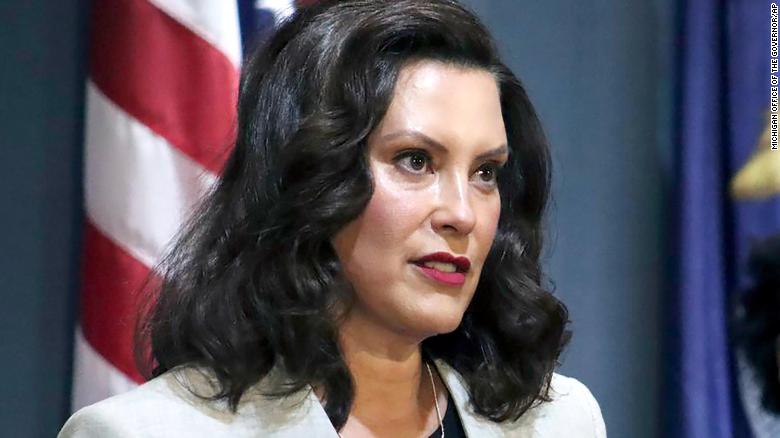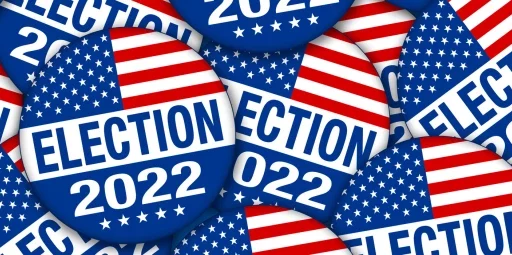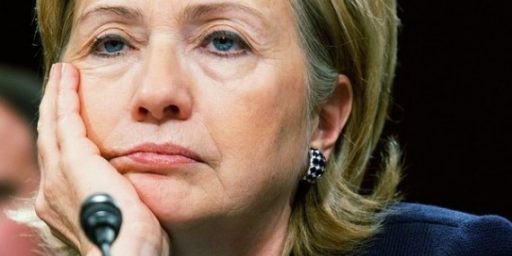Asking the Wrong Questions
Tudor's down. No laughing or drinking, just a crippled party.

This kind of headline (via the NYT) drives me a bit crazy, to be honest: A G.O.P. Test in Michigan: Is Trump a Help or a Hindrance? because it simplistically reduces a complex set of variables to a preferred narrative. While it is true that Trump is of significance to these elections, including being part of the trend that got the Republican candidate, Tudor Dixon, nominated in the first place, there are other factors that need to be taken into account (and that better explain where we are in this race, and where we are likely to end up).
First, the basic Trump-lined parameters from the piece:
As she runs to lead a narrowly divided swing state, Tudor Dixon is pursuing a hazardous strategy in the Michigan governor’s race: embracing Donald J. Trump, and at times emulating his no-holds-barred political style.
She hit the campaign trail recently with the former president’s son Donald Trump Jr. and Kellyanne Conway, the onetime Trump White House adviser — and, in Trumpian fashion, made headlines for mocking her Democratic opponent, Gov. Gretchen Whitmer, over a 2020 kidnapping plot hatched against her by right-wing militia members.
[…]
The contest also serves as a test of whether Ms. Dixon and other Republican candidates can win their general elections by harnessing the grass-roots energy of Trump supporters that propelled them to the top of crowded and chaotic primaries. That approach — which entails a close association with Mr. Trump’s election denialism and other political baggage — worries some Michigan Republicans who believe Ms. Dixon is failing to win over the kinds of suburban and independent voters who are crucial in tight races.
So, on the one hand, I agree that Dixon represents the Trumpista wing of the party and therefore she is a test, to a degree, of that approach.
But on the other hand, if we were to take Trump out of the equation let’s consider the following. What if I told you the following ingredients of a race?
- The incumbent governor is running for re-election.
- The incumbent governor won election in 2018 by almost ten points.
- The challenger has never run for office before.
- The challenger only won her party’s nomination with 38.7% of the primary vote.
- The challenger is having trouble raising money.
- The state is competitive. The state had a Republican governor as recently as 2014. It went Trump in 2016 (by a super-narrow margin, 0.23%) and was one of the close states for Biden (which he won by 2.78%).
If you told me all of that, and knowing nothing else, I would have said, granting that some other stories or factors could radically change things, that the odds are that the incumbent governor would win but that the challenger would have a respectable showing (defined as getting into the 40s). Such an outcome appears to be where we are headed.
Along those lines, FiveThirtyEight gives Tudor a 4% chance to win and projects a 54.0 v. 42.4% vote distribution, not all that different than Whitmer’s 2018 53.3% v. 43.7% win.
My point is that while I am not saying Trump doesn’t matter, the notion that Michigan is some test of Trumpism is simply wrong (but it does fit the desired narrative).
Beating an incumbent is a challenge and Whitmer is fairly popular, albeit not in an overwhelming way. As such, any challenger would likely be at a disadvantage unless there was something truly special about that candidate. There is nothing especially noteworthy about Tudor Dixon. Indeed, as noted above, there are several key problems (e.g., a newbie with a money problem) that heavily mitigate against her winning next month.
In other words, the Trump frame is off the mark here, as it is wholly likely we would be seeing the same results without the Trump variable. The key factors are fundamentals like incumbency, fundraising, challenger quality, and overall partisan environment.
Indeed, the story notes:
Not all Republicans who closely aligned themselves with Mr. Trump have struggled to pivot from the primary election to the general. In Arizona, the Republican nominee for governor, Kari Lake, has taken a similar approach, and has narrowed her race to a dead heat — but unlike Ms. Dixon, she is not facing an incumbent governor like Ms. Whitmer.
Other candidates backed by Mr. Trump, like Blake Masters in Arizona’s Senate race and Doug Mastriano in Pennsylvania’s contest for governor, have fallen behind their Democratic opponents as they have struggled to raise money. Another Republican Senate hopeful, J.D. Vance, is facing a closer-than-expected race in Ohio.
Indeed, there is a truly mixed bag in all of these races. Dr. Oz is doing poorly in PA, but Walker could very well win in GA. Prevailing partisan conditions are likely the culprit in both cases, but I digress.
The way in which Trumpism matters here is less in the general, and more at the primary level. Again, the decentralized nature of our parties is well on display here. If one was going to challenge Whitmer, this was not the candidate to do so, and yet this is the candidate that the nomination process produced.






I think you are underestimating Trump’s impact, and that of his followers. A moderate cannot get the nomination, and the inevitable trumper who gets the party nod has a huge uphill battle in winning the general.
This is perfectly illustrated in Maryland. The popular Republican Governor endorsed a primary candidate in his mold, a reasonable and competent moderate. She had real shot to win in the general. But Trump and the trumpers went after her and instead nominated a repulsive right wing loon, and he will almost certainly lose by a wide margin.
I find myself wondering how much of the coverage is part of the parallel “our long national nightmare is soon to be over” story so many are hoping will be true.
“Dr. Oz is doing poorly in PA”
A few polls came out this week with Oz down in the 2-5 point range, so that one is not over yet.
On the other hand, the same polls show Mastriano down by over 10 points. Some of the difference comes from Oz airing lots of ads attacking Fetterman as soft on crime, while Mastriano has aired virtually nothing. But some also comes from Mastriano following the Trump strategy of appealing to the base only, and not seeking to win undecided voters.
How? Trump is the Republican Party, and the Republican Party is Trump. He is supported by the party elites and the party faithful. He enjoys, in fact, near-universal approval among Republicans.
The narrative that needs to die is that there is some big anti-Trump GQP groundswell just under the surface, waiting to burst out into the open. Trump and Trumpism are the Republican Party establishment.
I’m not sure these “other factors” are necessarily more explanatory than Trump in this race (except the abortion and other policy factors, which, curiously, are not on the list). Seems pretty obvious a less Trumpy Michigan candidate would have a much better shot at unseating Whitmer. That’s at least equally explanatory as any other factor.
@Moosebreath:
The ads in question are involving a group of people who were pardoned after it became obvious they were innocent of the crimes they were convicted for, making the attack especially disgusting, but what can you expect from a professional con-artist like Oz?
On the other hand, if the ultimate objective, for the good of democracy and the country, is to rid ourselves of Trump and the Trumpist take-over of the GOP, I don’t mind at all if Trump takes the blame even if it isn’t appropriate to assign it to him.
Sometimes Trump hogging all the attention works in your favor. Embrace it.
@Stormy Dragon: Fetterman and other Democrats should go on offense on crime. Mass shootings and gun violence are scaring voters, while the right blocks serious gun reform. The 10 states with the highest murder rates, in order: Mississippi, Louisiana, Kentucky, Alabama, Missouri, S Carolina, New Mexico, Georgia, Arkansas and Tennessee. Trump states on average have murder rates 45% higher than Biden states. Red-state, Republican-mayored Tulsa, Jacksonville, Oklahoma City, and Lexington have homicide rates multiple times higher than New York and Los Angeles.
“Republican economic and gun policies make crime worse, proven by the awful crime rates in red states and Republican cities” seems an easy argument to make. I don’t know why Democrats aren’t making it.
@DK:
Note that you shift language from “crime” to “gun violence.”
Someone, somewhere pointed out that Democrats keep doing that, and that it is separating the two issues. And now, I see it everywhere.
Your first paragraph appears to give the candidate’s name in phone book format – Dixon Tudor. Folks in Michigan would hardly bat an eye – most haven’t even seen one ad for her.
@MarkedMan: If the outcome of the 2022 general ends up being within a few points of the 2018 general, exactly how much of a Trump effect would we be seeing?
This is a straightforward question about the general.
Now, as noted in the OP, Trump’s influence has some clear significance at the nomination stage. But, again, if the overall outcomes of the behavior of the electorate is what we would probably expect anyway, it undercuts the notion that we should frame the election analysis around Trump.
@DK: 38.1% in the primary hardly speaks of centralized support.
But even ignoring that, primary elections are definitionally decentralized processes.
@Franklin: The name doesn’t exactly roll off the brain. I will fix it. Thanks.
@Steven L. Taylor: Sure. You gave a legitimate example of a race where Trump’s influence is hard to measure. I’m not disagreeing with you. I’m just pointing out that there are races where his influence is very much on display, with easily discernible results. In that case, his influence in the primary is crucial, and resulted in an R candidate that will almost certainly lose versus one that had a good chance to win. In fact given the Dems race and lack of political background it is arguable that the leading non-Trump R candidate would be the favorite to win.
As you point out, reporters often try to wrap a story around Trump’s influence inappropriately. But there are a good handful of cases where his influence has dramatically affected the Republican chances, almost all to the negative.
@MarkedMan:
Most everything TFG touches turns to complete s***? No, how can it be? And in further news, bright shining fireball in sky continues to rise in east, gravity continues to anchor us to this planet, and Generalissimo Franco continues to refuse interview requests.
@MarkedMan:
The Nebraska governor’s primary earlier this year. The candidate who had literally nothing but Trump’s endorsement — never run for election before, opposed by the entire traditional Republican infrastructure, multiple credible sexual assault accusations — came within single digit percentage points of winning the nomination.
Long ago I went to high school and undergraduate school in Nebraska. The state’s always been conservative. But I have no clue where the “burn it all down” nihilism has come from.
We’re # 5! We’re # 5! We’re # 5!
Don’t ask me wtf happened above. It posted before I even made a comment. I guess I pushed the wrong button.
@Gustopher:
Meh. Six in one half, a half dozen in the others. These issues don’t exist in a vacuum, they’re intertwined.
I may say “criminal” here, “killer” there, and “murderer” elsewhere. That’s not a shift, it’s just the English language’s notorious multitude of words.
@Steven L. Taylor:
A Quinnipiac University poll conducted Oct. 15-18 found Trump with an 86% favorable rating among Republicans, versus just 10% unfavorable.
Quinnipiac also found 78% of Republicans want Trump to run again. Recent Harris and Morning Consult polling also found supermajority Republican support for a third Trump run — after he lost the popular vote twice by millions of votes, mocked a disabled reporter, tweeted a White Power video on 28 June 28 2020, incited the deadly Jan 6 terror attack with sore loser election lies, caused mass death and record unemployment with his COVID incompetence, stole and mishandled top secret classified documents, praised Putin’s genocidal warmongering, etc etc etc.
I understand why the numbers above will be dismissed, rationalized, explained-away, and caveated. Many establishmentarians of a certain demographic simply cannot hold Trump voters accountable for their amoral choices, lest the dinner party, men’s club, and Thanksgiving table convos get too uncomfortable.
But using stastiscal truthiness to insinuate Trump is not the central guiding force among Republican voters? Desperate and silly.
Truth can be a bitter pill. Y’all ain’t foolin’ nobody but yourselves.
@DK: True,
but what the academics have yet to understand is WHO the Republican Party Establishment actually is.
Republican politicians know exactly who the establishment is..and it ain’t them. It’s the Party infotainment media ecosystem. Trump understands this quite well, which makes him seem a bit more powerful than he is. He simply apes the establishment…but he will never wag the dog because it would dry up the cash flow.
@MarkedMan:
You have to admit that that is not the impression one get when your first comment is:
And you then proceed to talk about some other race.
I think I have been pretty clear that I think Trump and Trumpism matter rather significantly as a general matter, and especially at the nomination stage. I have written quite a bit about that.
But I think the press, writ large conflates these two things in a way that hampers understanding of the very distinct stages of the process.
@DK: None of that has anything to do with whether the nomination processes under discussion are centralized or decentralized.
We do not have a decentralized nomination process in the US. Period. You might as well be telling me that the moon is made of cheese.
If you are going to take issue with my post, please do me the courtesy of trying to understand what I am saying (especially since I have written about this topic quite a bit).
That most Republicans want Trump to run again/support Trump is true, but that doesn’t change what I have said (nor am I denying Trump’s popularity or significance).
@Jim Brown 32: “The academics” are pretty aware of the importance of the conservative infotainment complex.
“The academics” are also aware that “the Republican Party Establishment” is a disparate, decentralized, and somewhat abstract concept.
Why people want to argue otherwise is beyond me.
And I continue to note that for that “the other side is anti-science” what else is denigrating “academics”?